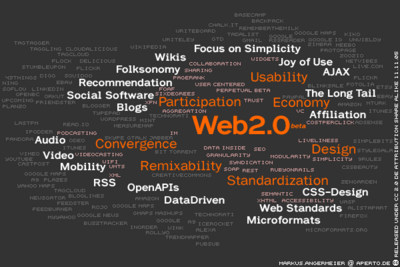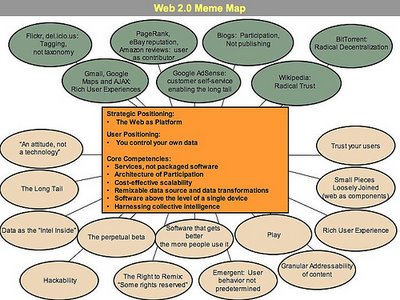Friday, August 11, 2006
The web is constantly evolving and getting increasingly democratic - ideas are coming from the bottom up. Collectives are seeing off the Golliaths of the net. Web 2.0 is a term coined at the end of 2004 and stands for the opening up the web and the open source, collective nature of thriving web businesses. Just look at wikipedia, Flickr, Threadless, Technorati and BoingBoing.net as examples of this.
Tim O'Reilly's seminal article gives an excellent overview of this trend.
Web 1.0 Web 2.0
DoubleClick --> Google AdSense
Ofoto --> Flickr
Akamai --> BitTorrent
mp3.com --> Napster
Britannica Online --> Wikipedia
personal websites --> blogging
evite --> upcoming.org and EVDB
domain name speculation --> search engine optimization
page views --> cost per click
screen scraping --> web services
publishing --> participation
content management systems --> wikis
directories (taxonomy) --> tagging ("folksonomy")
stickiness --> syndication
DoubleClick --> Google AdSense
Ofoto --> Flickr
Akamai --> BitTorrent
mp3.com --> Napster
Britannica Online --> Wikipedia
personal websites --> blogging
evite --> upcoming.org and EVDB
domain name speculation --> search engine optimization
page views --> cost per click
screen scraping --> web services
publishing --> participation
content management systems --> wikis
directories (taxonomy) --> tagging ("folksonomy")
stickiness --> syndication
Hopefully the video below explains this somewhat better than me!
Also check out this mind cloud from Wikipedia's article on Web 2.0. The image also appears in Flickr but with hyperlinked comments - perfectly summing up the collective spirit of Web 2.0.

And don't forget to read the related article that goes with it on Wikipedia.
This chart from O'Reilly on Flickr sums it up well too.

The web as we knew it is disappearing fast... the balance of power is shifting from the top to the bottom. More content is now uploaded by youngsters than is downloaded from the net. Welcome to the communual age of sharing. We must all embrace this and encourage engagement.
Subscribe to:
Post Comments (Atom)
0 comments:
Post a Comment